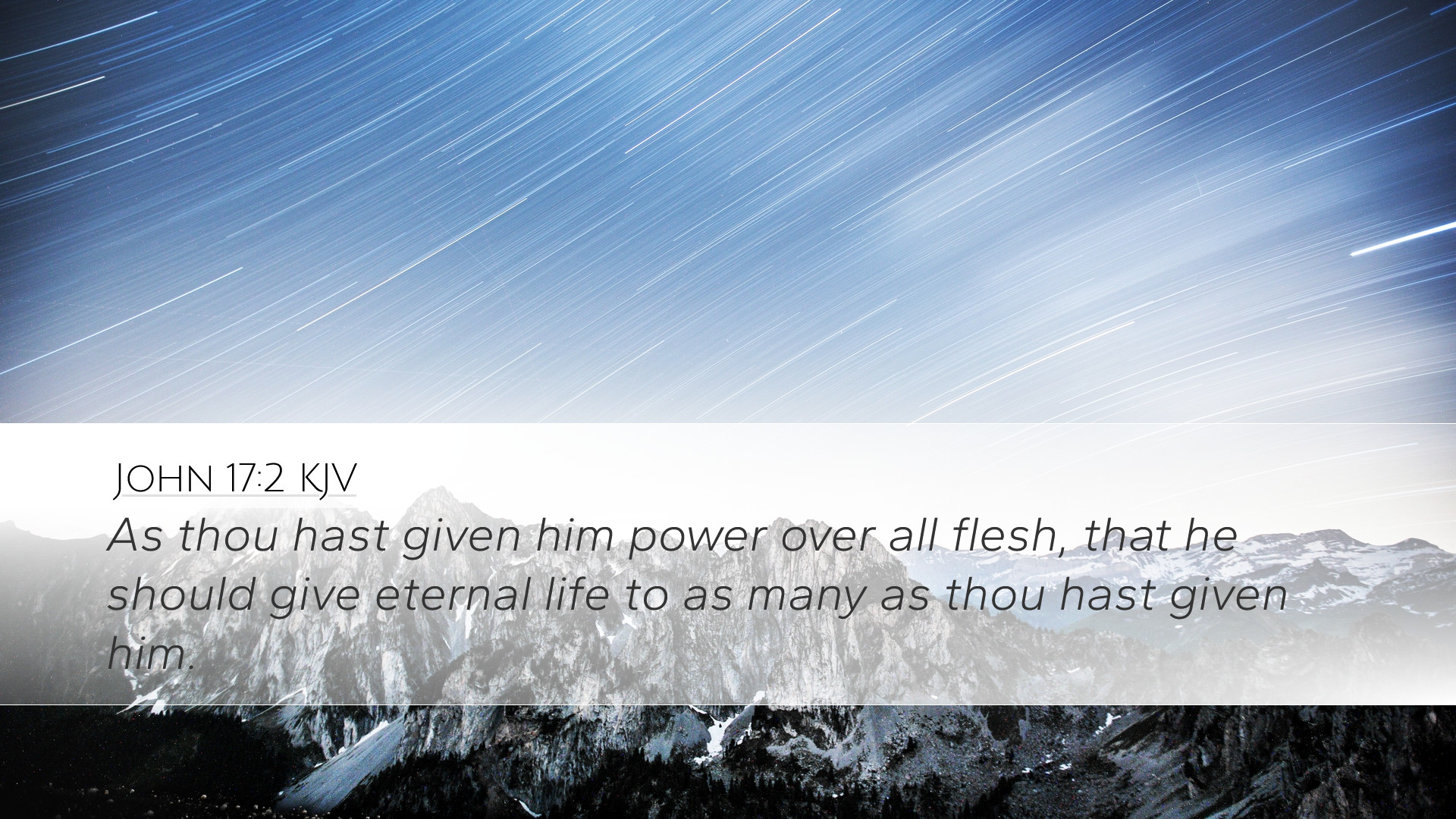Old Testament
Genesis Exodus Leviticus Numbers Deuteronomy Joshua Judges Ruth 1 Samuel 2 Samuel 1 Kings 2 Kings 1 Chronicles 2 Chronicles Ezra Nehemiah Esther Job Psalms Proverbs Ecclesiastes Song of Solomon Isaiah Jeremiah Lamentations Ezekiel Daniel Hosea Joel Amos Obadiah Jonah Micah Nahum Habakkuk Zephaniah Haggai Zechariah MalachiJohn 17:2
John 17:2 KJV
As thou hast given him power over all flesh, that he should give eternal life to as many as thou hast given him.
John 17:2 Bible Commentary
Commentary on John 17:2
John 17:2 states, “As you have given him authority over all flesh, to give eternal life to all whom you have given him.” This verse, a part of Jesus' high priestly prayer, encapsulates key theological themes regarding divine sovereignty, the authority of Christ, and the gift of eternal life.
Overview of the Authority of Christ
Matthey Henry emphasizes that the authority given to Christ is comprehensive, extending over "all flesh." This underscores the universal nature of Christ’s dominion. As believers, we recognize that His authority is not limited but encompasses every aspect of existence, which includes both the spiritual and the physical realms.
Moreover, Albert Barnes elaborates on the significance of the phrase “you have given him authority.” The context of this authority highlights the role of Jesus as the divine mediator between God and humanity. It's essential to understand that this authority was conferred by the Father, which illuminates the relational dynamic within the Trinity.
The Nature of Eternal Life
In this verse, the concept of eternal life is pivotal. Adam Clarke remarks that eternal life is not merely a future promise but includes an intimate relationship with God that begins in the present. Those to whom Christ gives eternal life are the ones whom the Father has entrusted to Him, depicting a divine interaction where God's elect are known and loved by both the Father and the Son.
- Gift of Grace: Eternal life is portrayed as a gift, one that is granted through grace, not earned by human merit. This theme resonates throughout the gospel, emphasizing humanity's dependence on divine favor.
- Relational Aspect: The eternal life mentioned here encompasses knowing God, suggesting a deep and transformative relationship with the Creator. Jesus defines eternal life in John 17:3 as knowing the one true God and Jesus Christ whom He sent.
Theological Implications
The implications of Christ’s authority are profound. Matthew Henry posits that this verse affirms Christ’s role in the divine plan of salvation. By possessing authority over all flesh, He is able to redeem and reconcile humanity. This mission is divine and assures believers of the prevalence of God's purpose throughout history.
Furthermore, it calls into question human autonomy and stresses the prevailing truth of divine election as articulated by Albert Barnes. Whoever belongs to Christ has been given to Him by the Father, indicating that our relationship with Him is not incidental but a crucial part of His redemptive plan.
Applications for Believers
For pastors and theologians, John 17:2 serves as a reminder of the authority of Christ in preaching and teaching. Believers are called to rest in the sovereignty of Christ as King and recognize their identity as His cherished possession.
- Confidence in Evangelism: Understanding that Christ has the authority to give eternal life enables believers to evangelize with confidence, knowing that it is not their efforts alone that draw people to salvation.
- Assurance of Salvation: The verse reassures believers that their salvation is secure in Christ, as it is based on God's electing grace. This security allows believers to approach God with boldness, knowing they are accepted in the beloved.
Conclusion
In summary, John 17:2 encapsulates core tenets of the Christian faith regarding Jesus' authority and the nature of eternal life. The insights from Matthew Henry, Albert Barnes, and Adam Clarke provide a comprehensive view that invites deeper reflection and understanding of these theological truths. As believers meditate on this verse, may they be encouraged to live out their faith with the assurance of Christ’s sovereign rule and the promise of eternal life.


